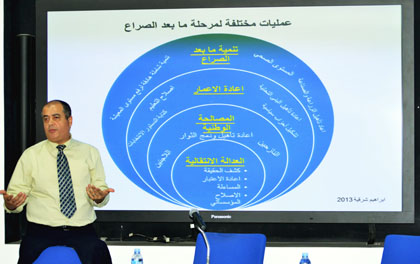 During its weekly seminar on Wednesday September 9, 2013, the Arab Center for Research and Policy Studies was pleased to welcome Dr. Ibrahim Sharqiyyeh, professor of international conflict at Georgetown University and Brookings Institute in Qatar. In his presentation, Dr. Sharqiyyeh analyzed post-Arab Spring national reconciliation based on his research conducted in Tunis, Libya, and Yemen, which included 160 field interviews with people from a variety of social positions in these societies.
During its weekly seminar on Wednesday September 9, 2013, the Arab Center for Research and Policy Studies was pleased to welcome Dr. Ibrahim Sharqiyyeh, professor of international conflict at Georgetown University and Brookings Institute in Qatar. In his presentation, Dr. Sharqiyyeh analyzed post-Arab Spring national reconciliation based on his research conducted in Tunis, Libya, and Yemen, which included 160 field interviews with people from a variety of social positions in these societies.
As the Arab Spring societies are undergoing a transformation from individual dictatorship regimes to multi-party democratic regimes, and while attempting to lay down a new social contract, these societies are prone to enter an era of bloody societal conflict. To guarantee the success of the democratic transformation in the Arab Spring states, and to avoid a bloody civil war, Sharqiyyeh discussed the necessity for these societies to launch a direct and comprehensive national reconciliation process, separating themselves from politicizing and revenging the past.
In doing so, he identified five major elements that, if properly implemented, constitute an accurate indicator for the success of a comprehensive national reconciliation. To be sure, failure to do so does not necessarily mean the onset of a bloody conflict, but it does indicate that the democratic transition process will be long-lasting and complicated. The elements are: the general challenges faced by the national reconciliation, the mechanisms used to deal with the past and unveil the truth, indemnification for the victims of oppression and repression endured in those countries, putting to trial officials from the old regime, and implementing the appropriate institutional reforms that guarantee there will be no more violations in the future. The research hypothesizes that successful national reconciliation in these countries is related to the level of progress achieved in terms of these elements. Based on these conditions, the researcher concluded that Tunis is the closest to accomplish national reconciliation, while Libya is the remotest from attaining that goal, due to the violence used to topple the old regime.